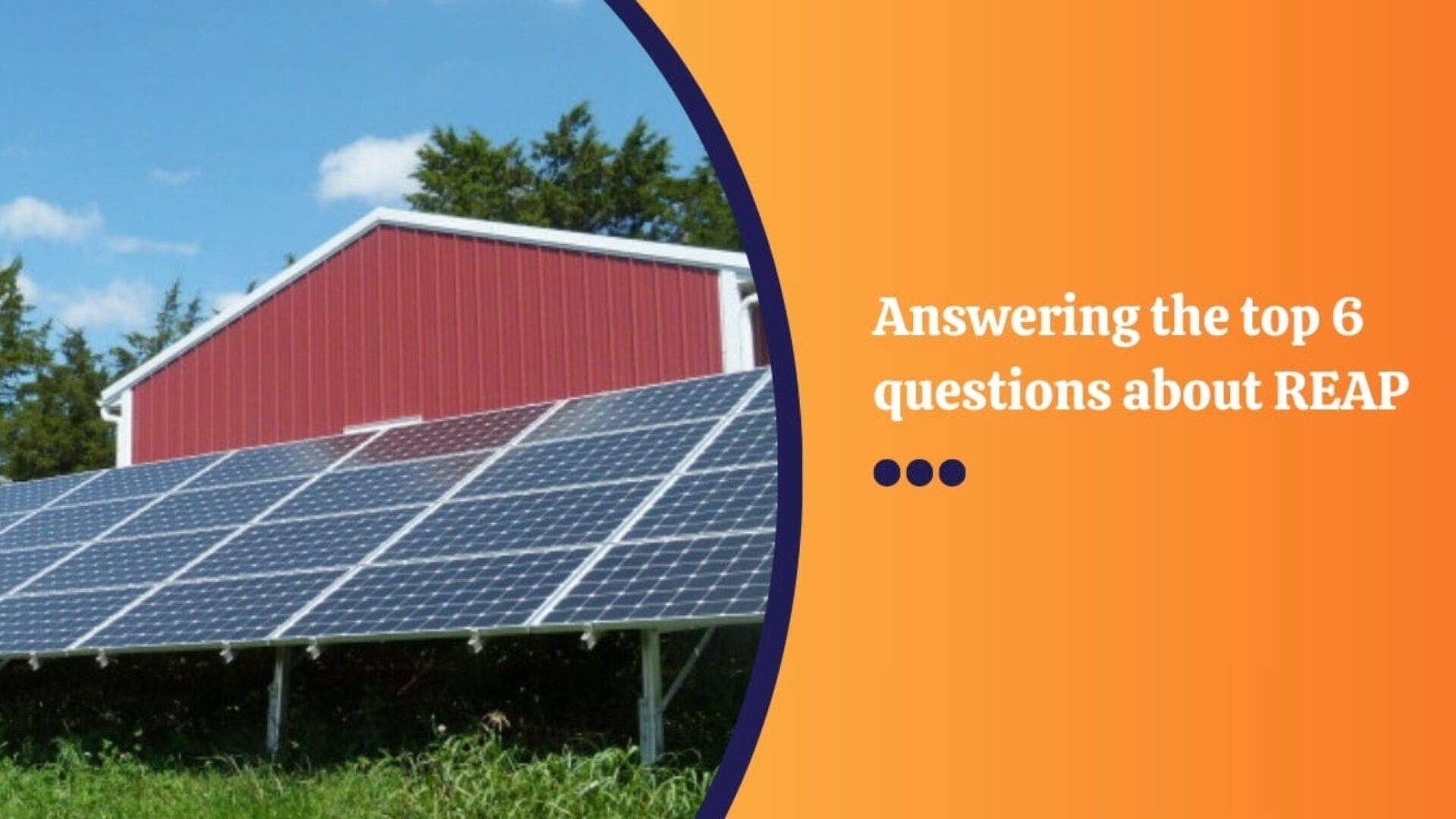Top 6 Questions Answered – REAP
- Rural Energy for America Program

REAP isn’t currently accepting grant applications.
The USDA has paused review of REAP applications. Please check back here for updates.
Whether you’re a small business owner or you own a farm, the Rural Energy for America Program (REAP) could be your key to unlocking the power of solar energy. Going solar is not just about saving money; it’s about enhancing your operational goals, promoting energy independence, and boosting local economies.
Let’s dive into the top questions you might have about REAP and how going solar can benefit your business.
1. How do I know if I’m eligible to apply?
You need to meet specific criteria to be eligible for REAP. Generally, agricultural producers and rural small businesses in the United States are eligible. Here are some factors to consider as you determine your eligibility.
- Location: If you’re a small business applicant, your project must be in a rural area. Urban areas with populations exceeding 50,000 typically don’t qualify. We recommend checking the USDA’s Rural Eligibility Map to make sure that your address is considered rural.
- Small Business Size: Small business applicants must also meet the Small Business Administration’s (SBA) size standards. That usually means having a tangible net worth of less than $15 million and an average net income of less than $5 million over the last two years.
- Agricultural Operations: To apply as an agricultural producer, you must earn at least 50% of your gross income from agricultural operations. That could include crop production, livestock, forestry, and other similar activities. Agricultural producers can be located in rural or non-rural areas, and do not need to meet SBA size standards.
2. Can a REAP grant fund solar on my home?
REAP grants are intended for agricultural producers and rural small businesses. Because the program’s focus is on promoting renewable energy in the commercial and agricultural sectors, projects that would provide residential benefits are not eligible. However, you may explore other federal or state incentives for residential solar installations.
3. Can I use a REAP grant to install solar and battery storage?
Yes, you can use a REAP grant to fund solar projects that include battery storage. This combination enhances your energy system’s reliability and efficiency, making it an attractive option. Integrating battery storage allows you to store excess energy for use during periods of low solar generation or as backup power during outages. Charging stations for electric vehicles, when paired with a solar installation, are another option to get the most out of your new, renewable system.
4. When are applications due / When should I apply?
You can apply at any time! The USDA has increased the number of application windows to four times a year through 2024, creating more opportunities to get funding. For each window, applications should be submitted by 4:30 p.m. local time on the closing date.
| Application Window Opens | Application Window Closes |
| January 1 | March 31 |
| April 1 | June 30 |
| July 1 | September 30 |
| October 1 | December 31 |
5. What happens after I apply?
After you submit your REAP grant application, it will undergo a competitive review process. The USDA will evaluate applications based on various criteria. These include the project’s viability, impact, and alignment with REAP goals. Your application will be scored on a 100-point scale. If your application is approved, you’ll receive funding to cover a portion of the costs of your solar project. It’s crucial to have a well-prepared application to increase your chances of success.
Download the Rural Business Guide for a detailed look at the process, and to estimate your score.
6. Can I still claim the federal solar investment tax credit if I receive a REAP grant?
Yes, you can still claim the federal solar investment tax credit alongside a REAP grant. The Federal Tax Credit is available to businesses installing solar energy equipment. You can combine it with other incentives, including REAP grants. This allows you to maximize your savings and make your solar project more financially attractive. We always advise consulting with a tax professional.
Your journey toward a brighter, more sustainable future begins here. REAP offers an affordable path toward solar, and Solar United Neighbors is here with information to help guide you through the process.
If you’re ready to explore REAP and gain a deeper understanding of how it can empower your business or agricultural venture, we invite you to download our free application guide. Inside, you’ll discover comprehensive insights, expert advice, and actionable steps to harness the potential of solar energy.
Take the first step and download the REAP guide today!
Get the latest on solar straight to your inbox.
Fight for your solar rights.
Everyone has the right to go solar. Spread the sunshine nationwide and in your local community by taking action, joining events, and more.
